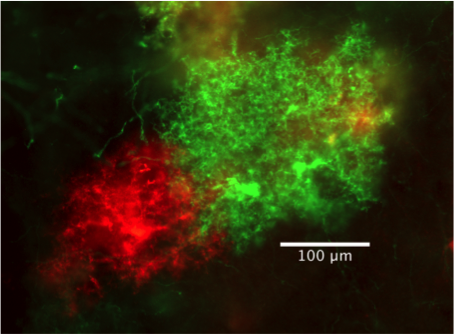About the Lab
Overview: The brain and the immune system are closely linked, both in health and disease. Our group studies how immune signals help to promote healthy brain development and function. We aim to define the ways in which the brain and immune system communicate during health as a window to understanding how this communication may malfunction in neuropsychiatric diseases including Autism Spectrum Disorders, Schizophrenia, and Neurodegeneration. Our group aims to understand the complex interactions between multiple cell types within the brain, including neurons, astrocytes, and microglia, and in particular, to define how innate immune signals shape healthy brain development, plasticity, and aging, both within the brain and in communication with peripheral immunity. Our goal is to achieve a cellular and molecular understanding of brain-immune communication that can inform new immune-based therapies for neuropsychiatric diseases.
Our findings: We have identified multiple cytokines that play unique roles in the assembly and function of the brain. For example, we demonstrated that the cytokine Interleukin-33 promotes remodeling of excitatory synapses by driving microglial engulfment of the extracellular matrix. We also found that Type I interferons, cytokines more commonly associated with antiviral responses, also play a key role in healthy brain development, by augmenting microglia’s ability to eliminate stressed neurons. We also found that Group 2 innate lymphocytes, producing the cytokine IL-13, promote the formation of inhibitory synapses during brain development. We continue to identify novel pathways regulating distinct aspects of circuit formation and function
Current questions: How do Type I interferon responses in homeostasis and infection impact brain development and pathology? How does the extracellular matrix of the brain shape synaptic function? How do stress, aging, and injury impact neuroimmune signaling in the brain and brain-body communication? How do cytokines shape Alzheimer’s Disease Pathology? Can we develop new tools to visualize cell types in the brain and live image cell-cell interactions?
Our approaches: We use a combination transcriptomics, imaging, electrophysiology, and behavior. The lab works mainly with murine models, but is also developing tools in the juvenile zebrafish, and engaging in clinical collaborations to study immune pathways in humans.
About the PI
Education and interests: I completed my undergraduate training in Neuroscience and Chemistry at Amherst College, and received my MD/PhD from the University of Michigan as part of the Medical Scientist Training Program (MSTP). My training focused on the molecular mechanisms regulating CNS stem cell self-renewal and aging, as well as molecular and functional characterization of glial heterogeneity. The Molofsky lab, was established at UCSF in July of 2015.
Clinical training: I completed my residency in adult psychiatry at UCSF and obtained additional training at the San Francisco Psychoanalytic Institute. I maintain a faculty practice at UCSF in the Department of Psychiatry and Behavioral Sciences in the Pritzker Psychiatry Building.
Honors, Awards, and Funding:
2025 Bowes Biomedical Researcher, UCSF
2024 Daniel Efron Award in Basic Science Research, American College of Neuropsychopharmacolgy
2023 Arc Innovation Award
2022 Weill Neurohub Next Great Ideas (with Weinstein Lab, U Washington)
2022 Ludwig Family Foundation award
2022 Sanghvi-Agarwal Innovation Award
2021 Established Investigator Award, Brain and Behavior Research Foundation
2019 Freedman Award in Basic Research, Brain and Behavior Research Foundation
2019 Joseph Altman Award in Developmental Neuroscience, Japanese Neuroscience Society
2017 NIH New Innovator Award
2017 Pew Biomedical Scholar
2016 Young Investigator Award, Brain and Behavior Research Foundation
2015 Career Award for Medical Scientists, Burroughs Wellcome Fund
2014 ACNP Travel Award, American College of Neuropsychopharmacology
2013 APA-Pfizer MD/PhD Psychiatric Research Fellowship, American Psychiatric Association
2007 Dean’s Award for Research Excellence, University of Michigan Medical School
2006 Harold M. Weintraub Graduate Student Award, Fred Hutchinson Cancer Center
1997 Phi Beta Kappa




